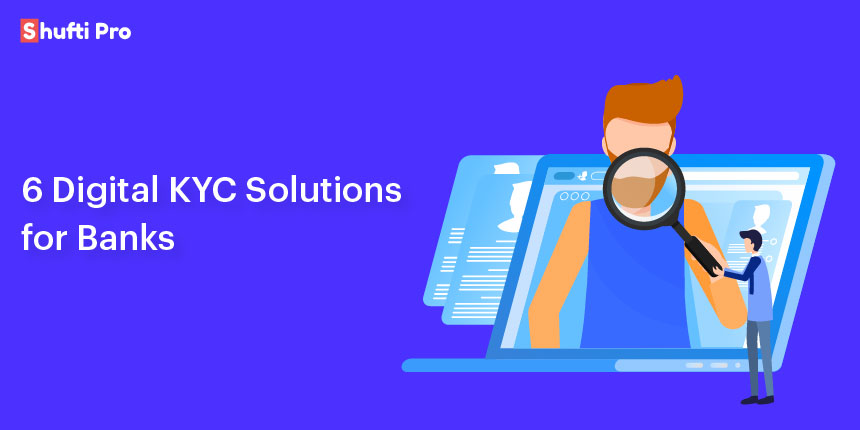6 Digital Solutions for Banks to Help with KYC

Digital KYC: For banks, streamlining the customer onboarding is essential. The manual way of entering client information into the system is redundant and time-consuming. In this age of ‘do it now’, banks need a tech-based approach for onboarding customers.
Also, technology alone can’t solve these problems. Its implementation needs to be strategic, logical and customer oriented. For example, banks need to comply with regulations such as know your customer (KYC), and the customers want swift and easy interaction with the banking system. AI-based digital solutions can help both the banks and the customers.
Read How Digital KYC Solutions Work in 60 Seconds
Problems Banks Currently Face in Onboarding
According to a KPMG report, a tier 1 bank could easily be spending about $100 million annually on onboarding clients. Despite spending this much, this manual process is error-prone, slow, risky (due to lack of regulatory compliance) and does not enhance the client experience.
The majority of the problems associated with client onboarding are related to the outmoded manual onboarding. For example;
- Manual form filling and questioning are time-consuming.
- There is an ever-increasing demand for transparency by the regulators. Keeping up with these demands is arduous.
- The process is complicated and slow from the customer’s perspective.
The solution to such problems should consider three main factors; the business side, regulatory compliance, and modern technology. Coordination among these three pillars will exhibit the benefits of digital KYC.
Here are 6 Digital Solutions to help with KYC
-
Face Verification
Simply put, the user takes a selfie with their smartphone or with a webcam. The software (digital KYC solution provider) ascertains the physical presence of the individual. AI-based methods can differentiate between a picture and a live face using 3D depth perception and color texture. This prevents spoofing attacks. Contemporary solution providers use micro expressions for verification as well.
-
Document Verification
With the camera of a smartphone or computer, the software scans documents for verification. Normally this includes verifying government-issued ID cards, passports, or driver’s license. Smart solutions determine the authenticity of documents and ensure that they are not tampered with. They also check for the format to assure that the document is original. For example, besides checking the apparent format of the passport it checks the machine readable zone (MRZ), which is usually located at the bottom of the identity page.
-
Address Verification
Verifying the physical address is a crucial part of the customer’s identity. It acts as a solid deterrence against identity theft. By ‘reading’ the government-issued documents such as ID cards, digital KYC solutions authenticate that the document is genuine, and the address mentioned on it is not forged or tampered with. The best services offer hybrid solutions; first, the document is verified by the machine, then, a trained person ensures that the verification is error free.
-
Two Factor Authentication
The combination of phone and internet is used in the two-factor authentication. The user simply enters their phone number into the app or software, then, a code is sent to their phone. The user is then requested to enter that code into the web interface to authenticate.
-
Anti Money Laundering (AML) Screening
Banks not only have to ‘know their customers’ but they also have to perform due diligence before they doing any form of business with them. They need to screen them to ensure that they are not listed on the anti-money laundering watch list. This service is also available to banks in a digital form. The best solutions out there update their database every few minutes, so that when they screen, it cross-checks with the most recent data.
-
Knowing Customers through Customized Documents
Smart digital solutions are capable of reading handwritten notes and custom documents. This is achieved through optical character recognition, which is powered by AI and machine learning. Digital KYC verification is an impetus for comprehensive due diligence.
Despite the various benefits, tech-based solutions alone are not enough. The integration needs to make business sense for banks. KYC – digital or manual – needs to be in compliance with the regulations. The majority of banks spend huge sums of money on compliance but still, come short on many fronts. Third party services are a cost-effective and feasible option; compliance is met and customers get fast and easy communication with the banks.
Find more relevant resources:











